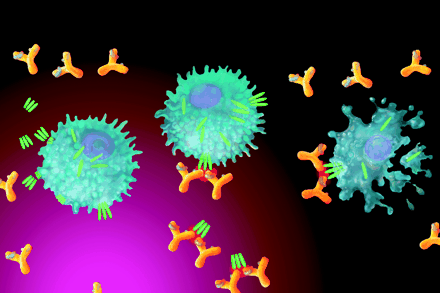Coming of Age:Anti–Cytokine Therapies
- Xiao-yu R. Song, PhD,
- Theodore J. Torphy, PhD,
- Don E. Griswold, PhD and
- David Shealy, PhD
- XyS. E-mail songx{at}centocor.com; Fax 610-651-7363.
Abstract
Although cytokines are critical in maintaining normal physiology, excessive production of these proteins can lead to pathological consequences. Inhibitors of cytokine production or action are therefore widely investigated as potential therapeutic agents in a variety of immune and inflammatory diseases. Indeed, the successful application of inhibitors of tumor necrosis factor-α in rheumatoid arthritis and Crohn's disease heralds the great therapeutic potential of biopharmaceutical agents to counteract cytokine activities. Emerging opportunities for new therapeutics, as well as the challenges we face in their use and development, are described in this review.

Cytokines are polypeptide regulators of intercellular communication within the immune system. The cells depicted above are
macrophages and T-lymphocytes responding to cytokines (green rods). The Y-shaped structures represent antibody-derived therapeutics
that recognize cytokines, either in circulation or bound to cell surface receptors, to block their action. Therapeutic strategies
that interfere with cytokine function may be effective in immune disorders such as asthma, cancer, arthritis, and transplant
rejection.
- © American Society for Pharmacology and Experimental Theraputics 2002



